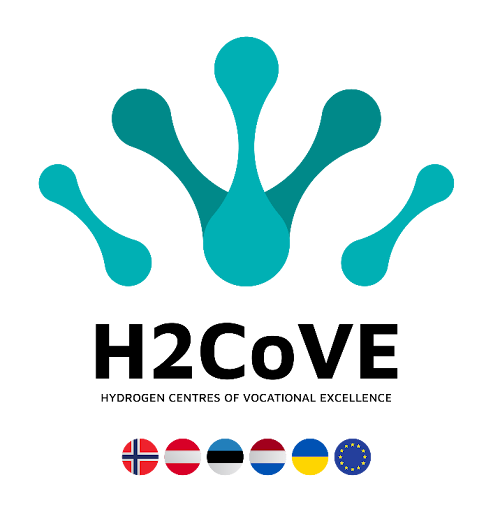
Hydrogen Centres of Vocational Excellence (H2COVE)
Call: ERASMUS-EDU-2023-PEX-COVE
Project title: Hydrogen Centres of Vocational Excellence
Project acronym: H2COVE
Project duration: start March 2024; duration: 48 months.
Max. funding: 4 000 000 EUR
Project website: (https://h2cove.eu/)
Free keywords: hydrogen, skills, VET, HVET, clean energy, ecosystems, value chains, carbon neutral, digital skills
Partnership:
- VESTLAND FYLKESKOMMUNE (Norway);
- HOGSKULEN PA VESTLANDET (Norway);
- Fagskulen Vestland (Norway);
- STICHTING NEW ENERGY COALITION (Netherlands);
- FEN RESEARCH GMBH (Austria);
- INSTITUTE OF HIGHER EDUCATION KING DANYLO UNIVERSITY (Ukraine);
- TALLINNA TEHNIKAÜLIKOOL (Estonia);
- SKYCORP OU (Estonia);
- Stichting Hanzehogeschool Groningen (Netherlands);
- FHS KUFSTEIN TIROL BILDUNGS GMBH (Austria);
- "KLASSE!FORSCHUNG"-BILDUNG TRIFFT FORSCHUNG & INNOVATION (Austria);
- HTL Kramsach, Glas und Chemie (Austria);
- FEN SUSTAIN SYSTEMS GMBH (Austria);
- Precarpathian eco-energy cluster NGO (Ukraine);
- STICHTING NOORDERPOORT (Netherlands);
- HARIDUS-JA TEADUS MINISTEERIUM (Estonia);
- TARTU LINN (Estonia);
- Professional College of King Danylo University (Ukraine);
- Drenthe College (Netherlands);
- SUSTAINABLE ENERGY AS (Norway);
- SAGA FJORDBASE AS (Norway);
- Energy Association "UKRAINIAN HYDROGEN COUNCIL (Ukraine);
- WIVA P&G-WASSERSTOFFINITIATIVE VORZEIGEREGION (Austria);
- Norwegian Hydrogen Forum (Norway);
- NEDERLANDSE WATERST EN BRANDSTOFCELLEN ASSOCIA (Netherlands);
- HYDROGEN EUROPE (Belgium);
- ESTONIAN HYDROGEN ENERGY SCIENTIFIC RESEARCH AN (Estonia).
Abstract:
The main objective of H2CoVE is to equip the European workforce with the right and necessary high-quality vocational skills for the industries included in the new value chains for the hydrogen economy. 5 regions: Westland in Norway, the Northern Netherlands, Tyrol in Austria, Estonia and the Carpathian region in Ukraine will pool their knowledge and experience to create local ecosystems for skills development. The need for investment in infrastructure for hydrogen production, storage and end-use is enormous, and a skilled workforce is a prerequisite. The partner regions have complementary assets and specialisations across the entire hydrogen value chain, and by working together they will help build capacity across Europe. Governments need to create a favourable environment and incentives for businesses to invest to accelerate the development of the hydrogen economy. H2CoVE will contribute to this by
- Connecting and engaging citizens, educational and research institutions, and businesses to continuously share knowledge and innovate in hydrogen skills at European level through a dedicated platform.
- Improving the necessary knowledge and skills among students, employees and potential workforce on basic and advanced applications for the hydrogen economy.
- Developing, updating and testing courses, modules, curricula that meet the needs of the industry in the partner regions at different levels of VET in an inclusive way.
- Ensuring the sustainability of project results through the implementation and transfer of best practices between ecosystems across Europe.
The project aims to involve 150 teachers from different levels of education in the ‘Train the Trainer’ courses and engage around 800 stakeholders from the business sector. 1000 employees will participate in upskilling and retraining activities, and 140 students will take part in a specially designed project competition for challenge-based learning. At least 12 project/bachelor's/master's theses will be written on real challenges in the sector.
KDU is also engaged in preparing a strategic educational portfolio for hydrogen technologies. The university is planning to incorporate hydrogen-related modules and courses into its Vocational Education and Training (VET) programs and university degrees, focusing on upskilling and reskilling professionals in the region. As a result, local industries will benefit from a skilled workforce capable of contributing to the production, storage, and application of hydrogen in various sectors. The university is actively engaging with regional companies and authorities to ensure that the project’s outcomes are shared widely and can influence local energy policy and development strategies.
In addition to curriculum development, KDU is collaborating with regional stakeholders on hydrogen infrastructure projects, such as the injection of hydrogen into gas grids and the production of green hydrogen. These initiatives are part of the larger regional energy program and are seen as vital for the future development of hydrogen technologies in western Ukraine. The university's role in H2CoVE positions it as a key player in promoting hydrogen technologies and advancing Ukraine's hydrogen economy while contributing to European efforts to transition to cleaner energy sources.
KDU’s participation in the H2CoVE project will not only enhance its academic standing but also strengthen its research capabilities in the hydrogen sector. The university is committed to fostering innovation, building local and regional hydrogen ecosystems, and playing a crucial part in Ukraine’s move toward energy independence and sustainability.
Partners from Ukraine
King Danylo University
https://ukd.edu.ua/en
Phone: +38(0342) 77 18 45 – Rector
Responsible person: Maksym Karpash, Vice-Rector for International Relations and Strategic Development
Contacts:
Phone: +380673420128
E-mail: maksym.karpash@ukd.edu.ua
PRECARPATHIAN ECO-ENERGY CLUSTER (PEEC)
https://peec.org.ua/en/
Responsible person: Lyudmyla Shyyko, manager and strategic director
Contacts:
Phone: +380506077780
E-mail: peec.org.ua@gmail.com
Energy Association “Ukrainian Hydrogen Council”
https://hydrogen.ua/en/
Responsible person: Oleksandr Diachenko, Vice President of the Energy Association "Ukrainian Hydrogen Council"
E-mail: das@hydrogen.ua


